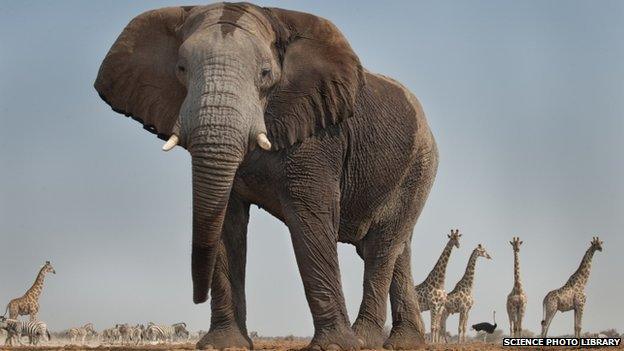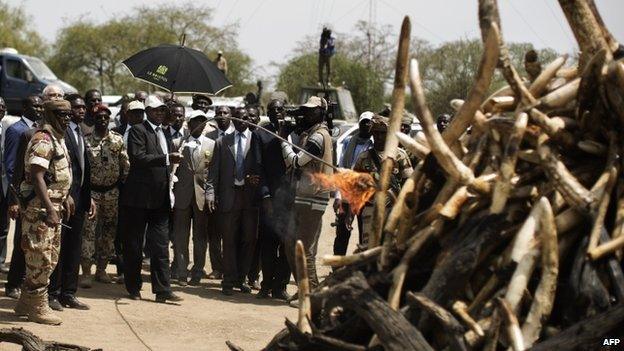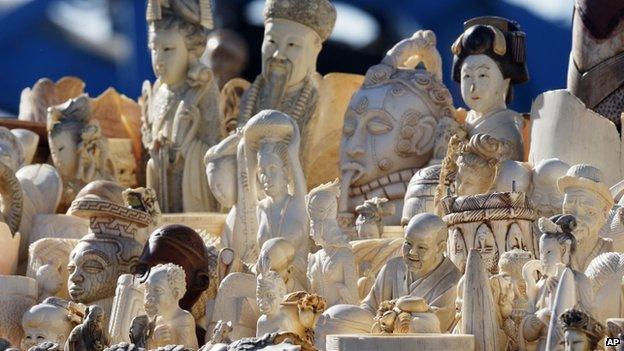Letter from Africa: Elephant in the room
- Published
- comments

In our series of letters from African journalists, film-maker and columnist Farai Sevenzo considers the outcome of the recent conference on the illegal wildlife trade, hosted by the UK government.
Sorry to go on about elephants when there are more pressing human problems all around us.
To be fair, the human problems will be with us for some time to come but alas, the elephants may not be.
Three princes, four presidents, various foreign affairs ministers, wildlife experts and a clutch of wildlife charities gathered in London earlier this month to shine a spotlight on the illegal trade in wildlife.
The numbers of murdered elephants are growing every day and of course there is a link to their gruesome deaths and the increasing demand for their ivory in markets as far afield as China and Vietnam.
The presidents of Botswana, Chad, Gabon and Tanzania all spoke up about the efforts being made to deter poaching. Those of us following this story were reminded by secret filming which showed ivory and rhino horn freely available in market stalls all over Asia.
They decided stockpiles of ivory around the world confiscated from smugglers and tusks taken from naturally expiring elephants and animals culled by game rangers were to be destroyed.
There were also reports that Prince William had expressed a yearning to destroy all the artefacts made of ivory in the British royal palaces.
Porous borders
If an elephant could have been present at the Wildlife in Danger conference, that elephant in the room would have applauded such high level interest in his species' fate.

Chad's president set alight a pile of tusks last Friday following the conference
But he would also have reminded all present that his kind do not hold passports and that many more African presidents, including those from Zambia, Zimbabwe, Malawi, Sudan, the Democratic Republic of Congo and everywhere else his species roam, should all agree or there would be holes bigger than the cavities where his tusks used to be in their efforts to save his kind from extinction through poaching.
Then he would look around the gathered delegates and strain his massive ears to hear what the Chinese and other Asian delegates had to say about the rise in value of ivory and the tremendous demand it commands in Asia.
He would want to know - is it true that the trade in ivory now commands billions of dollars? What is it about elephants the Chinese love so much, for there is no year of the elephant in their zodiac?
But the elephant in the room would hear nothing back, for the Asian delegates told us nothing and did not speak.
'White gold'
Even as the African presidents promised a 10-year moratorium on the sale of their ivory, the WWF estimated that the black market for the wildlife trade - including illicit ivory - was now nudging $19bn (£11bn) a year.

The illicit wildlife trade is estimated to total about $19bn (£11bn) annually
What does $19bn mean in the struggle to save the elephants?
It means that an elephant killer is no longer a lone bush tracker with a rusty rifle and a spear for back-up; that with billions at stake, organised crime can see money at every watering hole, in every country, through every porous border.
The poachers have global positioning satellite devices; they use rocket-propelled grenades and Kalashnikov rifles and carry off elephant tusks by helicopter.
The London Conference on the Illegal Wildlife Trade concluded in its declaration that "there is a serious threat to the survival of many species if action is not taken to tackle the… trade".
And the UN General Assembly has decided to proclaim 3 March as World Wildlife Day.
But the elephant in the room keeps going back to that outrageous figure - $19bn - and must surely conclude that no amount of proclamations can guarantee the elephants' survival in the face of such relentless Asian commerce for tusks.
It is one of the oddities of delayed conscience that governments rush to destroy things when our moral indignation floats above the dollar signs.
Does it make sense then to destroy stockpiles of ivory?
Should we not be legally selling it to those with an ivory fixation and using the funds to fight the war against poaching?
But if folk in Beijing continue to call elephant ivory "white gold", it seems that it is going to be a long and bloody war to save Africa's elephants.
If you would like to comment on Farai Sevenzo's column, please do so below.